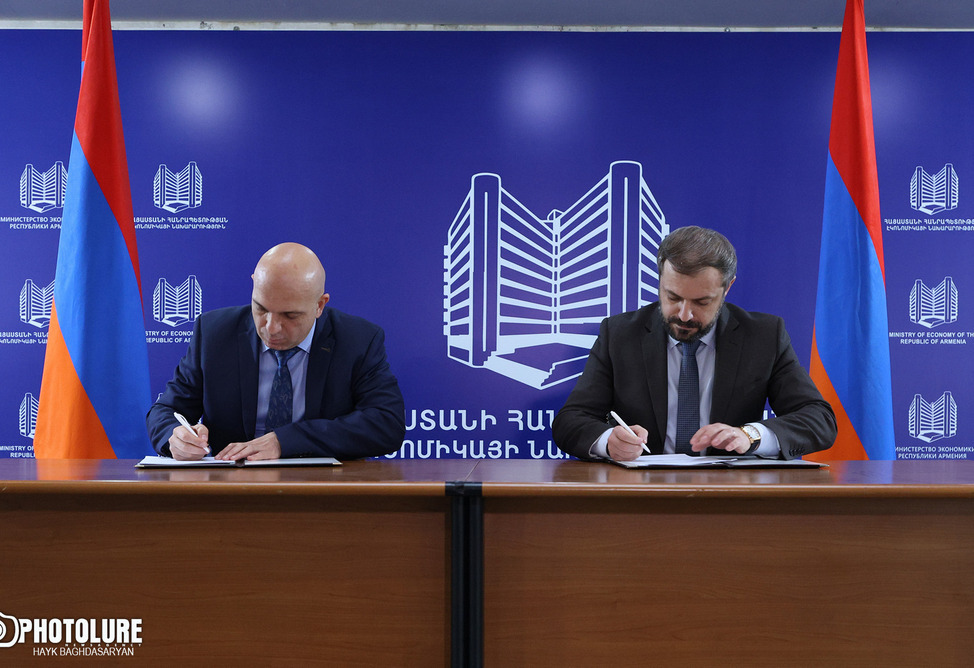EBRD has invested record 2.4 billion euros in Armenia - EBRD Managing Director for Turkey and Caucasus (EXCLUSIVE)

YEREVAN, November 26. /ARKA/. In an exclusive interview with the ARKA news agency EBRD Managing Director for Turkey and the Caucasus, Elisabetta Falcetti speaks about the bank's investments and goals in Armenia, as well as its priorities and future programs.
ARKA - How much has the EBRD invested in the Armenian economy since the beginning of its operations in the country? What are the key projects the EBRD is implementing in Armenia today?
Elisabetta Falcetti - Armenia is an important partner for EBRD, where we have invested over EUR 2.4 billion across 220 projects. EBRD’s Annual Meeting and Business Forum held in Yerevan earlier this year has shone a real spotlight on Armenia, with over 2000 participants from different parts of the world.
In addition, this resulted in EBRD’s high record of investments in Armenia. During this year we have already committed to invest EUR 374 million across 15 transaction and it is likely the number to surpass EUR 400 million by the year end. As an indicative comparison how large the volume was, for the past 5 years we invested in average of EUR 130 million per annum in Armenia.
Supporting private sector development is one of the main priorities for EBRD in Armenia. And one of the main instruments of reaching out to businesses is via local banks. We normally provide financial package to our local partner banks to be on-lent to the private sector to support their growth, competitiveness, making their practices more sustainable and environmentally friendly. These credit lines are offered to businesses along with incentive grants and technical advice provided by our donor partners, such as EU.
We have also made significant progress in our own Refugee Response Plan. Number of upskilling and reskilling initiatives were designed and implemented for the refugees to facilitate their economic integration. A significant financing package of EUR 44million will soon be announced and deployed via several partners banks for the benefit of refugees.
We have also been actively supporting the development of the infrastructure in Armenia. These efforts complement and support the Government’s Crossroads of Peace initiative. One of the most notable projects for this year was funding the construction of Sisian-Kajaran road part of the North-South corridor infrastructure rehabilitation. As Armenia is landlocked, solid road infrastructure is crucial for an efficient flow of trade that can support the value chain, increase diversification and accelerate the growth of the private sector and the economy as a whole. This is a big priority for Armenia that will significantly improve the connectivity of Armenia with its neighbours.
Construction of new customs and logistics centre in Syunik, was another important project to enhance trade and simplify export and import procedures for Armenian businesses. The project also has a soft component to integrate refugees into labour market in Armenia. What is more, the centre will be built to international energy efficiency standards and be one of the country’s first public structures to qualify as a “green building”.
Supporting renewable energy development in Armenia is yet another strategic priority for the EBRD. One of the landmark projects is Masrik Solar power plant, the first utility-scale solar power plant in Armenia, which is also the first in the Caucasus. The project is almost complete and once connected to the Armenian electricity grid it will significantly boost Armenia’s supply of renewable energy and while reducing its reliance on imported fuels.
Earlier this year EBRD, with fellow financial institutions (DEG, Proparco) approved financing for 200MW Aug-1 Solar Power Plant to be developed by Masdar. This project, once implemented, will play a significant role in Armenia’s energy security and we look forward to being part of this important journey.
During my visit, it was very encouraging to see some of the 87 new inclusive and environmentally friendly buses in the streets of Yerevan. This project is part of EBRD Green cities initiative, and we look forward to supporting further greening of Yerevan.
So many more interesting and important projects, for example supporting one of the most unique concepts in the ITC sector the Tumo centre for creative technologies. While financing construction of their the new EU – Tumo Convergence Center, we have also mobilized donor funding to support reskilling and upskilling of refugees, using Tumo’s highly successful model.
ARKA - What are the EBRD's goals and objectives in Armenia for the next 3-5 years? Are there plans to increase investments and what areas will the EBRD prioritise?
Elisabetta Falcetti - We are, of course, keen to maintain the momentum of elevated investments in years to come. So many interesting initiatives are being deployed in Armenia by the EBRD. We have very energetic, skilled and enthusiastic team in Yerevan that are passionate about supporting Armenia’s further development and integration into global economy.
Next month with the support of EU, we will be launching Capital Markets Support Program to boost the local capital markets and create alternative financing solutions for the local SMEs. The programme aims to provide assistance to Armenian corporate issuers of bonds and equity, through tailored capacity-building and grant co-financing of issuance-related expenses.
We look forward to delivering impact through financing key water and solid waste infrastructure, where the bank has a mandate to finance regional solid waste management facilities and number of water reservoirs. These are projects of strategic importance that will bring social, economic and environmental benefits.
During my trip I met with Government officials, development partners, with Central Bank Governor, with the Mayor of Yerevan and private sector players to learn more about the challenges and opportunities. I was accompanied by team of EBRD specialists who are key to designing our next country strategy. So, our discussions with the key stakeholders were integral to the forthcoming Armenia Country Strategy, which we anticipate to present to our Board for approval in the first quarter of 2025. The strategy will be the ‘roadmap’ for our investment priorities in Armenia for years 2025 - 2030.
ARKA- What are the EBRD's growth forecasts for Armenia for the current and next years, taking into account that in the last Regional Economic Outlook report the forecasts were kept at 6.2 per cent and 4.8 per cent.
Elisabetta Falcetti - After several years of extraordinary growth, we expect that GDP growth to be moderate in the short run. Indeed, we forecast real GDP growth to ease to 6.2 per cent in 2024 and 4.8 per cent in 2025 which is close to Armenia’s long-term potential growth rate. Temporary capital inflows related to the war on Ukraine have dissipated, but increased government spending to meet the needs of refugees and to strengthen national defences will compensate to some extent. However, geopolitical uncertainty poses sizeable risks to the economic outlook with a potential to affect it in both directions.
ARKA- How does the EBRD assess Armenia's economic prospects? Which key sectors do you think will be the drivers of growth in the near future?
Elisabetta Falcetti - In short term growth will be led by consumption and traditional sectors. However, the future growth potential of the economy is closely dependent on its diversification. Due to the geography and logistical challenges for integration in global value chains, the opportunity is seen in the expansion of IT services, hospitality industry and outsourcing of business services as well as in increasing the value added in agriculture and mining.
Agriculture currently employs one fifth of the employed population but with very low productivity. Therefore, the focus should be on introducing innovative solutions and new technologies, with the goal of moving agricultural products up the value chain for export.
ARKA- How do you assess the risks and opportunities for Armenia's economy and regional development in the context of geopolitical developments, in particular the peace talks between Armenia and Azerbaijan?
Elisabetta Falcetti As a small and landlocked market Armenia has been additionally disadvantaged by geopolitical challenges. The borders with two of its neighbours are closed, and international sanctions on the third neighbour, Iran, limits trade in that direction.
Since February 2022, economic sanctions on Russia introduced by many developed economies put the trade with Armenia’s biggest export market on a risky ground. Therefore, there are great opportunities in the case of improving geopolitical situation in the region. Open borders and better logistics could positively affect trade prospects, especially because Armenia has access to the EU market through the Comprehensive and Enhanced Partnership Agreement and to the central Asian markets of the members of the Euroasian economic union.
ARKA- What steps, in your opinion, could help the Armenian authorities to strengthen economic stability, ensure long-term growth and improve the investment climate?
Elisabetta Falcetti - We praise authorities’ sound macroeconomic management and professionalism in preserving financial sector stability. They serve as a strong pillar of economic stability. The government has made progress in reducing corruption, improving transparency and setting up anti-corruption institutions. Those reform efforts should continue. More efforts are needed in improving regulatory quality, enhancing institutional capacity and increasing government effectiveness.
ARKA- Does the EBRD take into account global trends such as the transition to a low-carbon economy and digitalisation when developing projects in Armenia? Which ones are particularly relevant to the country?
Elisabetta Falcetti - Low carbon economy and digitalisation are in the core of the current EBRD strategic focus in all our countries of operations including in Armenia. We believe digitalisation of public services in Armenia has a potential to enhance efficiency of public administration and improve governance. The green policy agenda can improve energy resilience of the country bearing in mind favourable natural conditions. We are ready to support the investments in solar energy, upgrading the transmission network and building more interconnections with neighbouring countries. That can strengthen energy resilience and at the same time accelerate the economic growth.-0-



